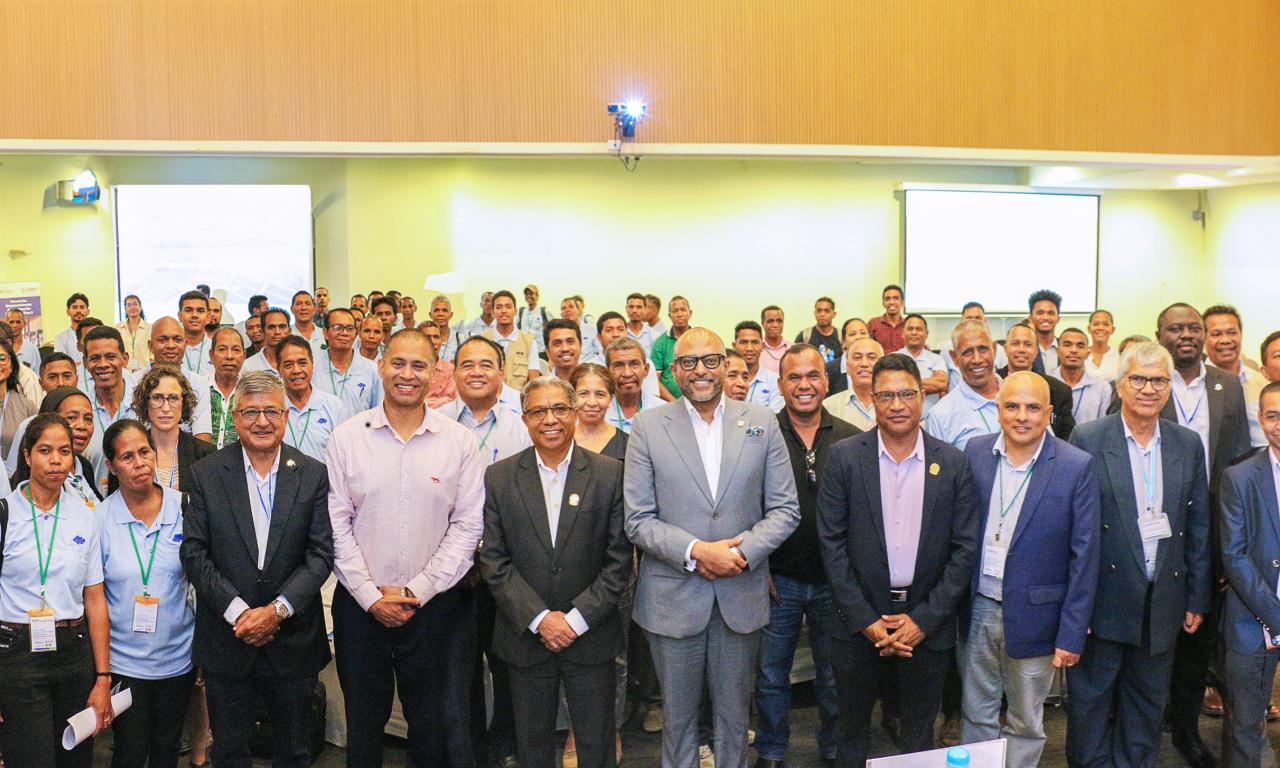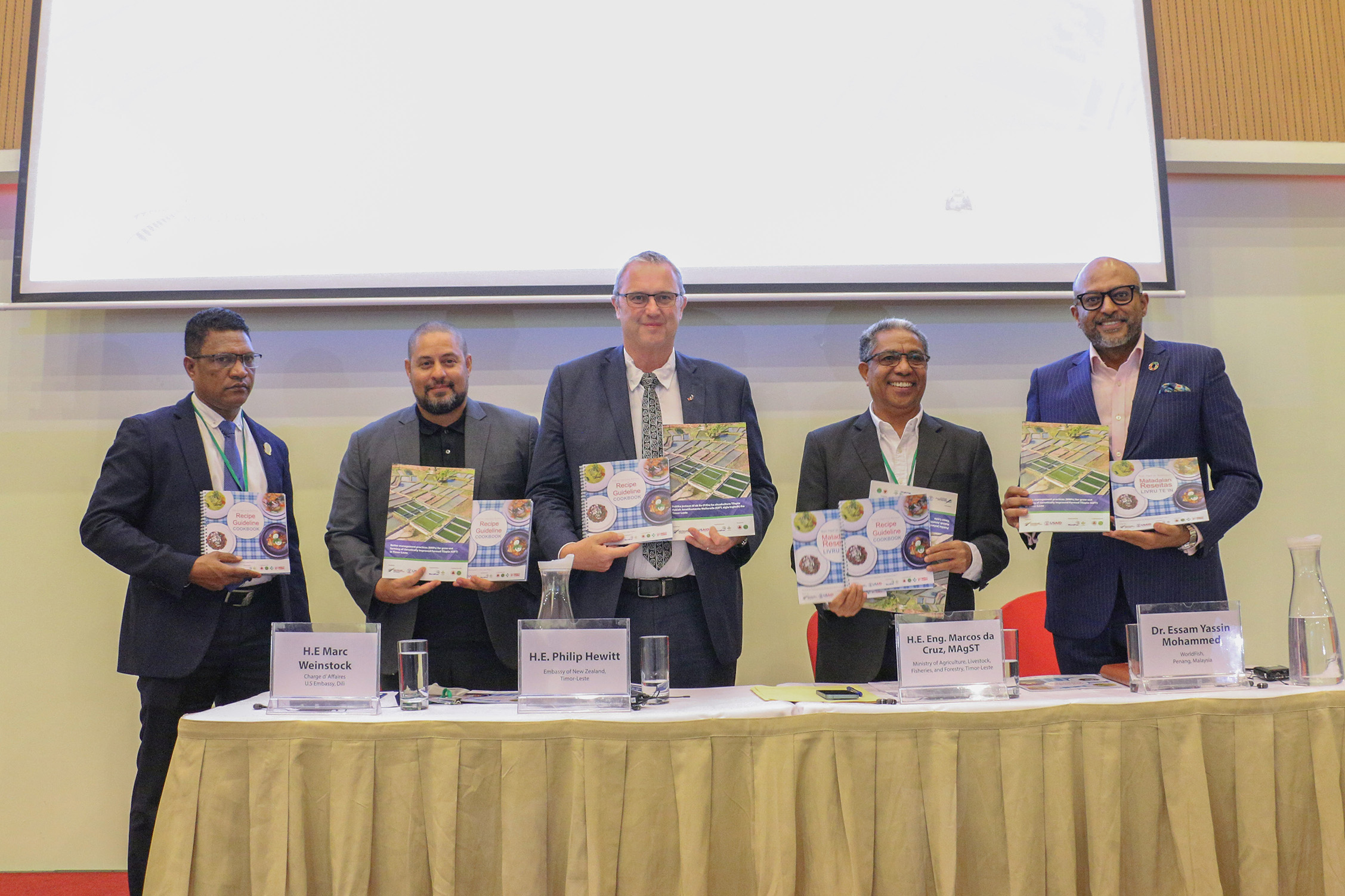
Stakeholders reaffirmed their ongoing support to scale aquaculture in Timor-Leste for improved livelihoods and food and nutrition security.
The commitment was made at the 3rd National Aquaculture Forum on 30 November and 1 December 2023 in Dili, Timor-Leste.
“We reaffirm our commitment to see the country’s growing aquaculture sector go from strength to strength,” said Dr Essam Yassin Mohammed, Director General, WorldFish.
WorldFish announced it will provide the latest strain of the Genetically Improved Farmed Tilapia (GIFT).
“We will replenish the current GIFT broodstock (14th generation) with a superior strain (17th generation).”
The GIFT broodstock was imported in 2015 from WorldFish in Penang, Malaysia, but needs to be replenished to ensure farmers get the best results from the fast-growing strain.

More than 150 representatives participated in the forum, sharing research and development experiences, and discussing challenges and opportunities.
“Fish farming will play a big role in diversifying livelihoods in rural areas,” said the Secretary of State for Fisheries, Domingos da Conceição dos Santos, in his welcome remarks.
“The main goal is to contribute to improved household incomes, nutrition and food security through sustainable aquaculture development.”
This aligns with the National Aquaculture Development Strategy (2012-30) that targets 12,000 tons of annual farmed fish production and 15 kg of yearly fish consumption per person by 2030.
Celebrating progress
The event was hosted by the Partnership for Aquaculture Development in Timor-Leste Phase 2 project (PADTL2; 2020-24).
The project is funded by the New Zealand Ministry of Foreign Affairs and Trade, with complementary funding from the United States Agency for International Development (2021-23), and implemented by WorldFish in partnership with the Timor-Leste Ministry of Agriculture, Livestock, Fisheries, and Forestry.
“Phase 1 (2014-19) developed high-quality seed and farm made feed, trained farmers in better management practices and worked with ministry staff to strengthen skills and knowledge,” said Dr. Jharendu Pant, Senior Aquaculture Scientist, WorldFish and PADTL2 Project Leader.
“Building on this foundation, Phase 2 has engaged with private sector partners to further increase fish production, access and consumption.”
There are more than 300 project fish farmers in six municipalities, growing out high-quality fingerlings produced by four private GIFT hatcheries in Leohitu, Parlamento, Hera and Colocau.
“Productivity has increased more than three-fold from 4.3 tons/ha in 2019 to 12.4 tons/ha per cycle in 2022,” said Dr. Pant.
“The culture time has also halved from 12 to six months after switching from farm-made feed to high-quality commercial feed pellets.
“Farmers can now realize over 24 tons/ha of fish productivity annually by completing two production cycles. This productivity is comparable to the major tilapia-producing countries in Southeast Asia.”
Dr. Mohammed emphasized that Timor-Leste’s successful aquaculture model provides a blueprint for other small island developing states.
“The Solomon Islands and Fiji are keen to replicate this model; this is how we can make Timor-Leste shine,” he said.
Building on a strong base
Marcos da Cruz, Timor-Leste Minister for Agriculture, Livestock, Fisheries and Forestry, praised the “excellent technology” in the keynote address.
“Now, we’re talking about how we further expand aquaculture, further scale it up to achieve our dreams.”
Emphasizing the need for coordinated efforts among stakeholders in realizing aquaculture growth, “It can’t just be the government on its own,” he said.
Philip Hewitt agreed, emphasizing the need to continue “combining efforts by working together”.
“The answers don’t lie with donors and government; they lie with the communities, private sector and farmers who have expertise, determination and resilience,” said the New Zealand Ambassador to Timor-Leste in a special address.
“The PADTL project has created a strong base to build support.
“We need to grow the industry by involving more farmers and private sector operators and building connections and linkages,” he said.
Supporting this, the Better management practices for grow-out farming of GIFT in Timor-Leste manual was launched at the event.

Sharing experiences
Hatchery operators, fish farmers, local service providers, and a feed supplier spoke of their experiences, sharing stories from the field.
“In June 2019, we launched the first private GIFT hatchery in Leohitu, which became a model for others to follow,” said hatchery owner João da Silva.
“We’ve now sold more than 2 million fingerlings and earned close to USD 60,000 since opening.
“With your support, I can stand here as a witness to the project and its multiple benefits that flowed to us and multiple communities,” he said.
Fish farmer and market operator Olderico Fernandes was proud to “create his own field of work”.
“I buy fish from groups and resell the fish for USD 4/kg in Lautem and USD 5/kg in Baucau,” he said.
“I sell live fish using my private vehicle that I’ve modified, and any remaining produce is put into our shop to sell.
“We continue to make improvements, and I also raise fish to sell, which provides income to sustain our family.”
Speakers and participants commended the holistic approach of PADTL and applauded the private sector in sustainably intensifying and scaling aquaculture in Timor-Leste.
Acknowledging the vital role played by private sector partners, “we really respect you,” said Dr. Pant. “You are the ones making the change in this country.”

Driving fish consumption
While aquaculture growth in Timor-Leste has led to more farmed fish being available, there is still limited awareness about its nutritional benefits and healthy, safe ways to cook fish.
The Fish in School Meals pilot program managed by the PADTL2 project tested one approach to support greater fish consumption by children in Ermera, an inland area that has limited access to fish.
“The pilot supplied farmed fish to 10 schools, whereby they provided one nutritious fish meal each week to 1,200 students over four months (July−October 2023),” said Dr. Gianna Bonis Profumo, Nutrition Consultant, WorldFish.
“We will use the pilot results and learnings to inform a way forward for incorporating fish into the National School Feeding Program, which could include using fish powder to greatly increase reach.”
Promoting fish consumption through social behaviour change has had positive results.
“We [the PADTL2 project with Mercy Corps] use village savings and loans groups as a key platform to encourage fish farmers to eat fish before selling and teach rural households to incorporate fish into two meals per week,” said Kay Klumpyan, Health and Nutrition Program Manager, Mercy Corps.
This is by giving demonstrations about properly deboning fish, teaching school cooks, and distributing a new Fish for Improving Nutrition Cookbook launched at the event.
“There has been a positive change in knowledge, attitudes and practices,” she said.
“Seventy-one percent of endline respondents reported someone ate fish in the last seven days, compared with 46 percent at baseline.”
Fish feed opportunities
Fish feed was a recurring discussion topic over the two days, as feed accounts for 40-70 percent of input costs and is essential to a good yield.
There are limited feed ingredients in the country to produce high-quality feed. Project fish farmers are using imported floating feed, purchased for USD 1.40/kilogram from a local feed importer.
Many participants expressed a strong interest in using locally-made feed in the future.
“There is a lot of science to be done before we start producing a local feed,” explained Dr. Rodrigue Yossa, Senior Scientist – Fish Feeds and Nutrition, WorldFish.
“The first step is a scoping analysis to understand the available ingredients and their nutritional composition.”
Agustinho Ximenes from Catholic Relief Services presented recent research into locally produced feed alternatives, spiking participants’ interest.
“From April to October 2023, we tested five different feeds, including black soldier fly larvae and tracked the weight and length of fish monthly,” he said.
“The fly larvae performed well, so we are hopeful of these promising results.”
Transforming aquaculture
With a scalable aquaculture model in place, participants discussed the next steps to spread fish farming across the 13 municipalities.
“We need to look at business incubation, procurement for farms, training and capacity building, and analysis of feed production centres,” said Nick Borthwick, Deputy Head of Mission, Embassy of New Zealand.
“Access to finance is key. Donors need to work with the government to free up finance for small-to-medium enterprises.”
“We also need to look at insurance to support businesses against the shock of events like drought, flood and disease risks,” he said.
“The big opportunities for funding are fishpond construction, feed production, and a mosaic of processing initiatives.”
While participants recognised there are many challenges and a long road ahead, they were inspired, motivated and hopeful by the forum presentations and discussion.
“The foundation for transforming aquaculture in Timor-Leste is there,” said Dr. Mohammed.
“We are on this journey together.”
Marc Weinstock, Charge d’Affaires, US Embassy, agreed, “We can achieve so much more when we partner together to achieve common goals.
“Let’s continue to support innovations and improvements in fish farming to improve Timorese households and livelihoods for the days, weeks and months to come.”
Related publications:
-
Better management practices (BMP) for grow-out of Genetically Improved Farmed Tilapia (GIFT) in Timor-Leste: https://digitalarchive.worldfishcenter.org/handle/20.500.12348/5648
-
Prátika jestaun di’ak liu (PJDs) ba akuakultura Tilapia Hakiak Jenetikamente Mellorada (GIFT, sigla Inglesh) iha Timor-Leste (Better management practices (BMP) for grow-out farming of Genetically Improved Farmed Tilapia (GIFT) in Timor-Leste): https://digitalarchive.worldfishcenter.org/handle/20.500.12348/5664
- Fish for Improving Nutrition Cookbook (English): https://digitalarchive.worldfishcenter.org/handle/20.500.12348/5658
- Livru Te’in ba Ikan Hadi’ak Nutrisaun (Fish for Improving Nutrition Cookbook): https://digitalarchive.worldfishcenter.org/handle/20.500.12348/5659
- Aquaculture successes celebrated at 3rd national forum in Dili, Timor-Leste: https://worldfishcenter.org/press-release/press-release-aquaculture-successes-celebrated-3rd-national-forum-dili
